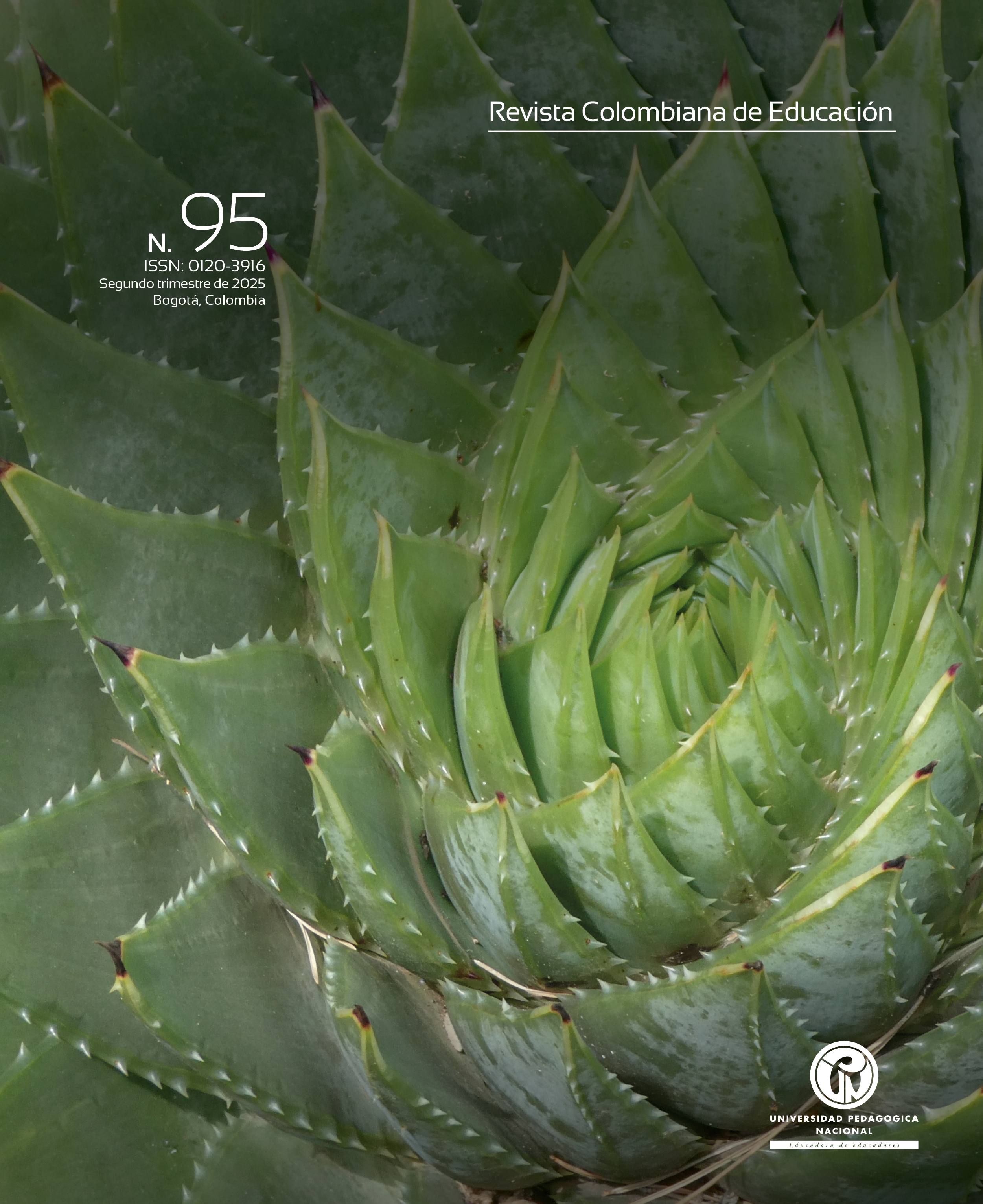Interacciones pedagógicas, género, competencia percibida, desempeño e interés en áreas STEM
Resumen
El presente estudio buscó analizar la relación entre las interacciones pedagógicas que puedan ser diferenciadas según el género y la competencia percibida, el desempeño, y el interés de estudiantes en tres asignaturas stem (Biología, Sistemas, Matemáticas), en los grados 6.° a 11.°. Se filmaron las interacciones entre docentes y estudiantes, y se solicitó al alumnado diligenciar un instrumento de autoinforme para medir su interés y competencia percibida. También se tomaron los datos de su desempeño en las diferentes asignaturas. Participaron 103 estudiantes de secundaria y cinco docentes de una institución pública de Cali. Los resultados muestran niveles medios en el interés, la competencia percibida, y el desempeño, y una disminución generalizada de estos a medida que se avanza en el ciclo escolar, así como correlaciones positivas significativas moderadas entre el interés y la competencia percibida. Se evidenció que las mujeres mostraron resultados inferiores a los hombres en la competencia percibida. También se identificaron interacciones diferenciadas por género en la modalidad de reacción evaluativa docente, y se establecieron relaciones entre tres tipos de interacciones diferenciadas por género y la variable de desempeño, teniendo un impacto positivo para los hombres.
Citas
Amaya, J., Díaz, M. y Sánchez, M. (2017). Capítulo 9. Metodología para impulsar el interés en las stem en niñas de secundaria en el sur de Cali. En E. Serna (coord.), Investigación formativa en ingeniería (pp. 100-107). Editorial Instituto Antioqueño de Investigación. https://dialnet.unirioja.es/descarga/libro/876878.pdf
Andersen, I. (2023). Teachers’ Gender Bias in stem: Results from a Vignette Study. British Educational Research Journal, 49(4), 833-851. https://doi.org/10.1002/berj.3870
Archer, L., Moote, J., Macleod, E., Francis, B. y DeWitt, J. (2020). ASPIRES 2: Young People’s Science and Career Aspirations, Age 10-19. ucl Institute of Education. https://discovery.ucl.ac.uk/id/eprint/10092041/
Baldeón-Padilla, D., Valencia-Serrano, M. y Alvarado, J. (2020). Amenaza de estereotipo, género y desempeño académico en matemáticas. Magis. Revista Internacional de Investigación en Educación, 13. https://doi.org/10.11144/javeriana.m13.aegd
Burnette, J., Hoyt, C., Russell, V., Lawson, B., Dweck, C. y Finkel, E. (2020). A Growth Mind-Set Intervention Improves Interest but Not Academic Performance in the Field of Computer Science. Social Psychological and Personality Science, 11(1). https://doi.org/10.1177/1948550619841631
Camp, A. van., Gilbert, P. y O’Brien, L. (2019). Testing the Effects of a Role Model Intervention on Women’s stem Outcomes. Social Psychology of Education, 22(3). https://doi.org/10.1007/s11218-019-09498-2
Chan, R. (2022). A Social Cognitive Perspective on Gender Disparities in self-efficacy, Interest, and Aspirations in Science, Technology, Engineering, and Mathematics (stem): The Influence of Cultural and Gender Norms. International Journal of stem Education, 9(1). https://doi.org/10.1186/s40594-022-00352-0
Copur-Gencturk, Y., Cimpian, J., Lubienski, S. y Thacker, I. (2020). Teachers’ Bias Against the Mathematical Ability of Female, Black, and Hispanic Students. Educational Researcher, 49(1), 30-43. https://doi.org/10.3102/0013189X19890577
Copur-Gencturk, Y., Thacker, I. y Quinn, D. (2021). K-8 Teachers’ Overall and Gender-Specific Beliefs About Mathematical Aptitude. International Journal of Science and Mathematics Education, 19(6). https://doi.org/10.1007/s10763-020-10104-7
Covarrubias, R., Laiduc, G. y Valle, I. (2019). Growth Messages Increase help-seeking and performance for Women in stem. Group Processes and Intergroup Relations, 22(3). https://doi.org/10.1177/1368430218802958
Eccles, J. (2009). Who Am I and What Am I Going to Do with My Life? Personal and Collective Identities as Motivators of Action. Educational Psychologist, 44(2), 78-89. https://doi.org/10.1080/00461520902832368
Eccles, J. (2007). Where Are All the Women? Gender Differences in Participation in Physical Science and Engineering. En S. Ceci y W. Williams (eds.), Why Aren't More Women in Science?: Top Researchers Debate the Evidence (pp. 199-210). American Psychological Association. https://doi.org/10.1037/11546-016
Ekmekci, A. y Serrano, D. (2022). The Impact of Teacher Quality on Student Motivation, Achievement, and Persistence in Science and Mathematics. Education Sciences, 12(10). https://doi.org/10.3390/educsci12100649
Espinoza, A. y Taut, S. (2016). El rol del género en las interacciones pedagógicas de aulas de matemática chilenas. Psykhe, 25(2). https://doi.org/10.7764/psykhe.25.2.858
European Commission. (2021). She Figures 2021 Gender in Research and Innovation: Statistics and Indicators. Autor.
Franco-Gallego, J. (2017). Abandono de estudios y equidad educativa: un análisis empírico aplicado a grupos poblacionales en el caso colombiano 1998-2016 (ponencia). Congreso CLABES VII. Córdoba, Argentina.
García-Holgado, A., Díaz, A. y García-Pẽalvo, F. (2019). Engaging Women into stem in Latin America: W-stem Project (conferencia). TEEM’19: Proceedings of the Seventh International Conference on Technological Ecosystems for Enhancing Multiculturality, León, España. https://doi.org/10.1145/3362789.3362902
Gaspard, H., Lauermann, F., Rose, N., Wigfield, A. y Eccles, J. (2020). Cross-Domain Trajectories of Students’ Ability Self-Concepts and Intrinsic Values in Math and Language Arts. Child Development, 91(5). https://doi.org/10.1111/cdev.13343
González-Pérez, S., Mateos de Cabo, R. y Sáinz, M. (2020). Girls in stem: Is It a Female Role-Model Thing? Frontiers in Psychology, 11 https://doi.org/10.3389/fpsyg.2020.02204
González-Rogado, A., García-Holgado, A. y García-Peñalvo, F. (2021). Mentoring for Future Female Engineers: Pilot at the Higher Polytechnic School of Zamora (ponencia). Proceedings. 11th International Conference on Virtual Campus, jicv 2021, Salamanca, España. https://doi.org/10.1109/JICV53222.2021.9600410
Instituto Colombiano para la Evaluación de la Educación (Icfes). (2020). Informe nacional de resultados para Colombia: pisa 2018. Autor.
Jaremus, F., Gore, J., Prieto-Rodriguez, E. y Fray, L. (2020). Girls Are Still Being ‘Counted Out’: Teacher Expectations of high-level Mathematics Students. Educational Studies in Mathematics, 105(2), 219-236. https://doi.org/10.1007/s10649-020-09986-9
Jiang, S., Simpkins, S. y Eccles, J. (2020). Individuals’ Math and Science Motivation and their Subsequent stem Choices and Achievement in High School and College: A Longitudinal Study of Gender and College Generation Status Differences. Developmental Psychology, 56(11). https://doi.org/10.1037/dev0001110
Kalender, Z., Marshman, E., Schunn, C., Nokes-Malach, T. y Singh, C. (2020). Damage Caused by Women’s Lower self-efficacy on Physics Learning. Physical Review Physics Education Research, 16(1). https://doi.org/10.1103/PHYSREVPHYSEDUCRES.16.010118
Kirschner, S. (2020). What Does It Mean to Say Science Is Gendered? Journal of Theoretical and Philosophical Psychology, 40(1). https://doi.org/10.1037/teo0000136
Laboratorio de Economía de la Educación. (2023). Las mujeres son minoría en las carreras stem. Informe Análisis Estadístico lee, 67. https://www.javeriana.edu.co/recursosdb/5581483/8102914/Informe-67-Mujeres-en-STEM-9feb2023-LEE.pdf
Lavy, V. y Megalokonomou, R. (2019). Persistency in Teachers’ Grading Bias and Effects on Longer-Term Outcomes: University Admissions Exams and Choice of Field of Study. NBER Working Paper Series. National Bureau of Economic Research. https://doi.org/10.3386/W26021
Lewis, J., Schneegans, S. y Straza, T. (Eds.). (2021). Unesco Science Report: the Race Against Time for Smarter Development. Unesco.
Lytle, A. y Shin, J. (2020). Incremental Beliefs, stem Efficacy and stem Interest Among First-Year Undergraduate Students. Journal of Science Education and Technology, 29(2). https://doi.org/10.1007/s10956-020-09813-z
Makransky, G., Petersen, G. y Klingenberg, S. (2020). Can an Immersive Virtual Reality Simulation Increase Students’ Interest and Career Aspirations in Science? British Journal of Educational Technology, 51(6). https://doi.org/10.1111/bjet.12954
Marsh, H., Pekrun, R., Parker, P., Murayama, K., Guo, J., Dicke, T. y Arens, A. (2019). The Murky Distinction between self-concept and self-efficacy: Beware of Lurking jingle-jangle Fallacies. Journal of Educational Psychology, 111(2). https://doi.org/10.1037/edu0000281
Martín-Carrasquilla, O., Santaolalla-Pascual, E. y Muñoz, I. (2022). La brecha de género en la educación stem. Revista de Educación, 2022(396). https://doi.org/10.4438/1988-592X-RE-2022-396-533
Master, A. y Meltzoff, A. (2020). Cultural Stereotypes and Sense of Belonging Contribute to Gender Gaps in stem. International Journal of Gender, Science and Technology, 12(1), 152-198. https://genderandset.open.ac.uk/index.php/genderandset/article/view/674
Master, A., Cheryan, S. y Meltzoff, A. (2016). Computing Whether She Belongs: Stereotypes Undermine Girls’ Interest and Sense of Belonging in Computer Science. Journal of Educational Psychology, 108(3). https://doi.org/10.1037/edu0000061
Merayo, N. y Ayuso, A. (2023). Analysis of Barriers, Supports and Gender Gap in the Choice of stem Studies in Secondary Education. International Journal of Technology and Design Education, 33(4), 1471-1498. https://doi.org/10.1007/s10798-022-09776-9
Muenks, K., Wigfield, A. y Eccles, J. (2018). I Can do This! The Development and Calibration of Children’s Expectations for Success and Competence Beliefs. Developmental Review, 48. https://doi.org/10.1016/j.dr.2018.04.001
Oppong-Gyebi, E., Dissou, Y., Brantuo, W., Maanu, V., Boateng, F. y Adu-Obeng, B. (2023). Improving stem Mathematics Achievement through self-efficacy, Student Perception, and Mathematics Connection: The Mediating Role of Student Interest. Journal of Pedagogical Research, 7(4), 186-202. https://doi.org/10.33902/JPR.202321085
Pérez-López, D. (2021). “Am I not good at it, or am I not good at all?” stem Gender Gaps in Higher Education. Universidad de los Andes. https://repositorio.uniandes.edu.co/entities/publication/05dbbac3-b31e-47c9-8ed0-cfc5b3f1566b
Pérez-Mejías, P., McAllister, D., Díaz, K. y Ravest, J. (2021). A Longitudinal Study of the Gender Gap in Mathematics Achievement: Evidence from Chile. Educational Studies in Mathematics, 107(3), 583-605. https://doi.org/10.1007/s10649-021-10052-1
Pérez, L., Nix, S. y Thomas, K. (2017). Gendered Pathways: How Mathematics Ability Beliefs Shape Secondary and Postsecondary Course and Degree Field Choices. Frontiers in psychology, 8(386), 1-11. https://doi.org/10.3389/fpsyg.2017.00386
Rose-Markus, H. y Kitayama, S. (2010). Science Perspectives on Psychological Perspectives on Psychological Science Cultures and Selves: A Cycle of Mutual Constitution. Perspectives on Psychological Science, 5(4), 420-430. https://doi.org/10.1177/1745691610375557
Rosenzweig, E., Wigfield, A. y Eccles, J. (2022). Beyond Utility Value Interventions: The Why, When, and How for Next Steps in Expectancy-Value Intervention Research. Educational Psychologist, 57(1). https://doi.org/10.1080/00461520.2021.1984242
Schmader, T. (2023). Gender Inclusion and Fit in stem. Annual Review of Psychology, 74, 219-243. https://doi.org/10.1146/annurev-psych-032720-043052
Schmidt, J., Beymer, P., Rosenberg, J., Naftzger, N. y Shumow, L. (2020). Experiences, Activities, and Personal Characteristics as Predictors of Engagement in stem-focused Summer Programs. Journal of Research in Science Teaching, 57(8). https://doi.org/10.1002/tea.21630
Schmidt, J., Kafkas, S., Maier, K., Shumow, L. y Kackar-Cam, H. (2019). Why Are We Learning This? Using Mixed Methods to Understand Teachers’ Relevance Statements and How They Shape Middle School Students’ Perceptions of Science Utility. Contemporary Educational Psychology, 57. https://doi.org/10.1016/j.cedpsych.2018.08.005
Seo, E., Shen, Y. y Alfaro, E. (2019). Adolescents’ Beliefs about Math Ability and Their Relations to stem Career Attainment: Joint Consideration of Race/ethnicity and Gender. Journal of Youth and Adolescence, 48(2). https://doi.org/10.1007/s10964-018-0911-9
Shumow, L. y Schmidt, J. (2013). Academic Grades and Motivation in High School Science Classrooms among Male and Female Students: Associations with Teachers’ Characteristics, Beliefs, and Practices. En R. Haumann y G. Zimmer (eds.), Handbook of Academic Performance: Predictors, Learning Strategies and Influences of Gender (pp. 53-72). Nova Science Publishers.
Verde-Flota, E., Gallardo-Hernández, G., Compeán-Dardón, S., Tamez-González, S. y Ortiz-Hernández, L. (2007). Motivos de elección de carrera en mujeres estudiantes de profesiones de la salud. Revista de la Fundación Educación Médica, 10(1). https://doi.org/10.33588/fem.101.40
Verdugo-Castro, S., García-Holgado, A. y Sánchez-Gómez, M. (2022). The Gender Gap in Higher stem Studies: A Systematic Literature Review. Heliyon 8(8). https://doi.org/10.1016/j.heliyon.2022.e10300
Wang, M., Te. y Degol, J. (2013). Motivational Pathways to stem Career Choices: Using expectancy-value Perspective to Understand Individual and Gender Differences in stem Fields. Developmental Review, 33(4), 304-340. https://doi.org/10.1016/j.dr.2013.08.001
Wigfield, A. y Eccles, J. (2020). 35 Years of Research on Students’ Subjective Task Values and Motivation: A Look Back and a Look Forward. Advances in Motivation Science, 7, 161-198. https://doi.org/10.1016/bs.adms.2019.05.002
Wigfield, A., Eccles, J. y Möller, J. (2020). How Dimensional Comparisons Help to Understand Linkages Between Expectancies, Values, Performance, and Choice. Educational Psychology Review, 32(3). https://doi.org/10.1007/s10648-020-09524-2
Zahidi, S. (2023). Gender Global Gap Report 2023. World Economic Forum.
Descargas
Derechos de autor 2024 Revista Colombiana de Educación

Esta obra está bajo una licencia internacional Creative Commons Atribución-NoComercial 4.0.






























